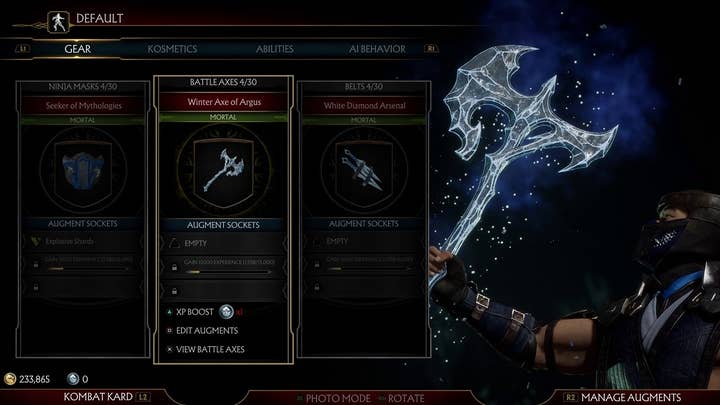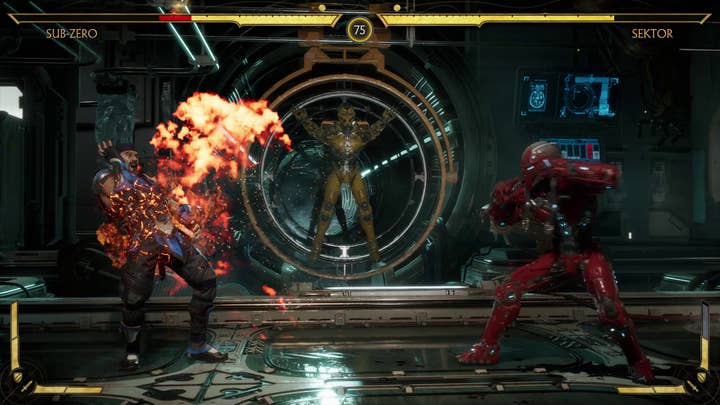Mortal Kombat 11: Critical Consensus
Reviewers applaud the meat and bones of NetherRealm's latest, but question the method for unlocking skins
Violence has long been perceived as the beating heart of the Mortal Kombat franchise, but it's also become known for a number of other qualities, including a substantial single-player component and a storyline as over-the-top as the game's distinctive fatalities. Mortal Kombat 11 arrives tomorrow, and the first reviews indicate that NetherRealm Studios has built on those in largely admirable ways, but with one significant caveat.
In his 9 out of 10 review of the game for IGN, Mitchell Saltzman says Mortal Kombat 11 is "not only the best Mortal Kombat has ever been, it's also arguably NetherRealm's best game yet."
The core of the fighting action has actually been slowed down since Mortal Kombat X, Saltzman notes, thanks to the elimination of the run button and slower walking speeds.
"At first, I wasn't a huge fan of how slow Mortal Kombat 11 felt, but the more time I put in, the more I started to appreciate how these seemingly small changes added up to change the flow of a match in a great way," he says. "With a greater emphasis placed on careful positioning and whiff punishing and less of a focus on all-out blitzing to impose your 50/50 mix-up game, fights feel more tactical and rewarding of smart play."
CGM's Cole Watson similarly notes the slowed down action as a positive change that puts it more in line with the series' original arcade entries, and lavishes praise on the game's story mode in his own 9.5 out of 10 review.
"From the opening act, to its climactic finale, I was completely invested in every second of Mortal Kombat 11's action-packed campaign and its mind-blowing cinematics," Watson says. "NetherRealm Studios continues to deliver the best fighting game story modes in the industry and MK 11 might just be their finest crafted one yet."
The story, which mashes together past, present and future versions of the franchise's cast as a new antagonist named Kronika looks to wipe the universe's convoluted chronology clean, is drawing praise from a number of critics, including Mike Williams from our sister site USgamer in his 3.5 out of 5 review.
"It's Mortal Kombat, so most of the story is nonsense," Williams says, "but it's equal part nonsense and grandeur. These feel like epic, meaningful moments, even for someone like myself who only tangentially follows this continuity."
In his own 8 out of 10 review-in-progress for GameSpot, Ed Tran agrees that mix of new and old versions of characters makes the game approachable for fans who haven't exactly been keeping up with the Jaxes. It also helps that Mortal Kombat 11 boasts a thorough series of tutorial features to get players acquainted not just with the characters and their moves and combos, but more subtle strategic concepts like match management or creating pressure and technical aspects like understanding frame data.
"It's an impressive resource that doesn't just give you a better understanding of Mortal Kombat 11's systems, but a deeper understanding of fighting game mechanics in general -- knowledge that you can take to any other title," Tran says.
However, another potential strength of Mortal Kombat 11 -- its intricate customization features and bevy of unlockables -- also serves as its Achilles heel.

"The amount of customizable options for each character is utterly staggering, with each character having at least 60 skins, 90 pieces of customizable gear, and a selection of ten techniques to add on to their core set of abilities," Saltzman says. "To be fair, most of the skins are simply recolors of the default outfits, but regardless, there are a ton of ways to make your fighter distinct when playing online. The problem is how you get access to them, which is generally not a great time."
Unlocking items is mostly done through The Krypt or the Towers of Time mode. The Krypt is a gameplay-light recreation of Shang Tsung's island from the original Mortal Kombat that is strewn with treasure chests to open using virtual currency. The Towers of Time is a series of regularly changing challenges where the fights take place with unusual modifiers.
"No matter how good you think you are at Mortal Kombat (or how bad you think I am), trying to fight an opponent where you're constantly being targeted and shot and frozen in place by devastating lasers from the sky, or being chased by missiles that turn your screen pitch black if one hits you, is a rotten experience," Tran says. "Being the loner in a 2vs1 match, or fighting a much hardier opponent whose attacks can't be interrupted, is more of an exercise in frustration than it is a hearty challenge."
While some reviewers found the Krypt mode marginally better for its nostalgia value and Easter eggs, it was still widely panned for feeling like an interminable grind, as ShackNews' Ozzie Mejia explains in his 7 of 10 review of the game.
"If it was just coins that unlocked items in the Krypt, that'd be one thing, but MK11 introduces multiple currencies and keeping track of those is a chore in itself," Mejia says. "Some chests are tied to other currencies, with the 'hearts' standing out, in particular.
"There are chests in the Krypt that cost 250 or more hearts, which is fine and all, except hearts are unlocked one at a time over the course of natural gameplay by performing a fatality. A few more are available by completing Towers of Time, but the whole thing feels set up for microtransactions, which weren't available at the time of this review. While it's theoretically possible to earn everything via natural gameplay, the process is so slow that it feels like it's geared towards pushing people into going the microtransaction route."
Last year, Mortal Kombat 11 publisher Warner Bros. Interactive Entertainment made news for removing the loot box system from the Lord of the Rings game Middle-earth: Shadow of War. The loot boxes weren't a big problem for reviewers, but a vocal contingent of players and pundits found it undermined the game experience. In pulling the mechanic, developer Monolith Productions agreed.
With the exception of Watson, all of the above reviewers expressed concern or frustration with Mortal Kombat 11's progression system and the potential for abuse depending on its treatment of virtual currencies, some of which were not even detailed for reviewers. Similarly the game has a Premium Shop with no indication given ahead of launch as to what might be sold there.
In Williams' estimation, Mortal Kombat 11 is a game that shows a wonderful level of craft in most aspects, but the overall product is marred by obtuse and overly complicated systems seemingly designed to push players into spending more money.
"The Towers of Time and Krypt are so full of grind, padding, and additional currency that it simply sucks all the fun out of playing to unlock more for your favorite character," Williams says. "And though there's no store up in my review version, I have to assume those design decisions were made in favor of monetization and microtransactions. Which is a shame, because it's akin to Mortal Kombat 11 performing a Fatality on itself."


